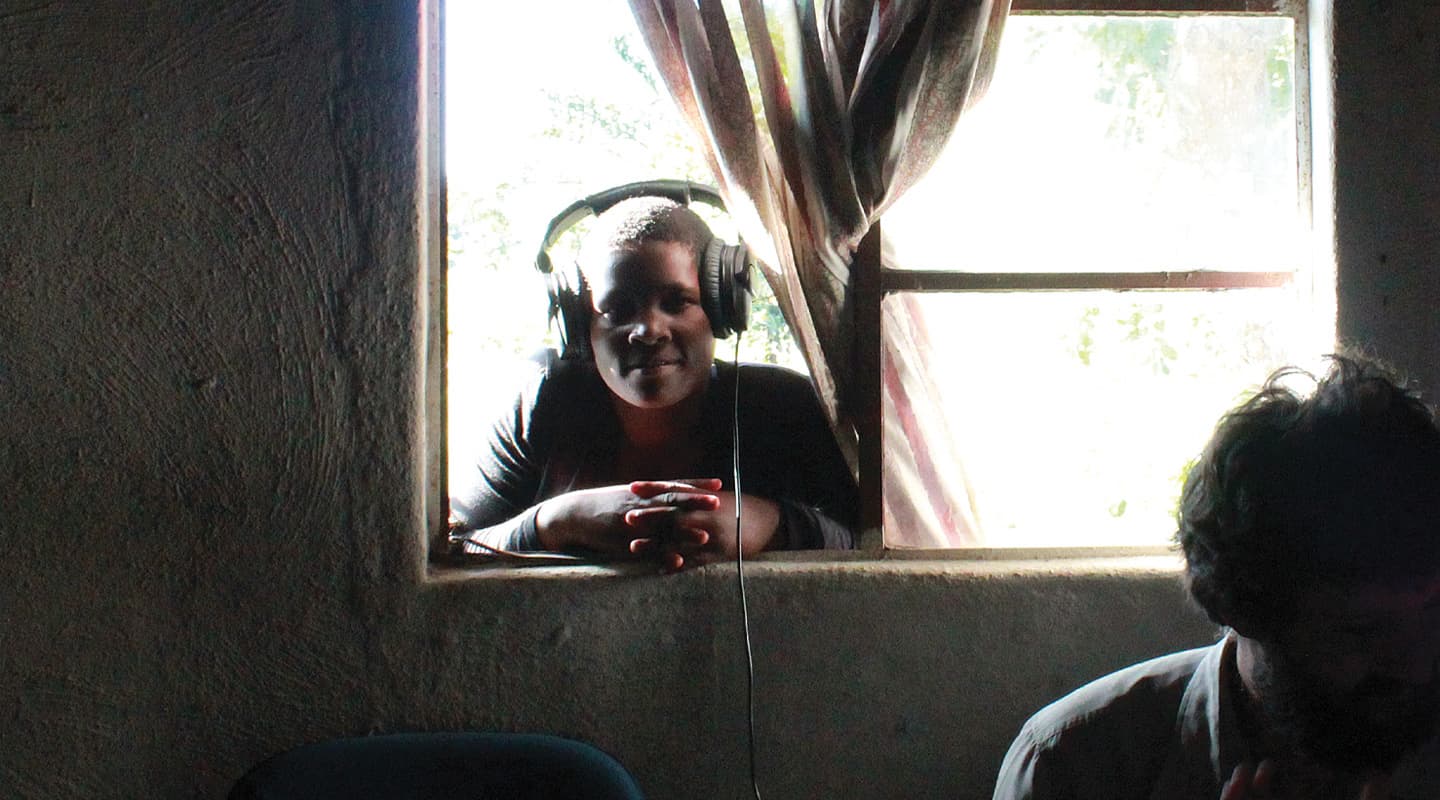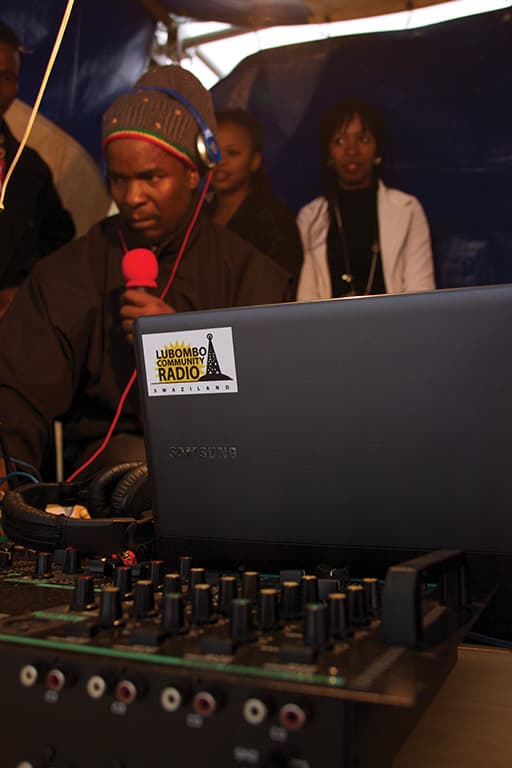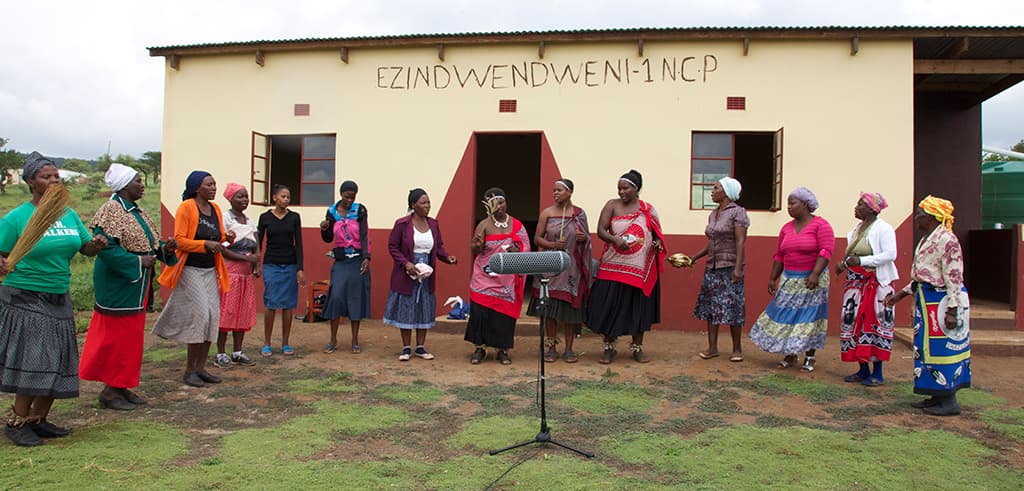
On The Wavelength
Melbourne producer, Myles Mumford, has been helping Swazi artists have a voice on the issues killing their nation.
The prototypical Western ‘struggling artist’ has nothing on the Swazi musician.
In Swaziland, getting airtime isn’t the issue, having enough fuel to get to the studio is. And lusting after esoteric gear isn’t a luxury enjoyed when you have to rent a guitar to play. But there are bigger fish to fry in Swaziland, and musicians are playing a key role in getting the message out.
IT’S INFECTIOUS
The Kingdom of Swaziland is a small country bordered on three sides by South Africa. Its other neighbour, Mozambique, is over the Lebombo Mountains to the West. The waistline of the country is relatively slim, at 130km, holding a population over a million. It’s one of the few remaining absolute monarchies in the world, in the company of Brunei, Oman, Qatar, Saudi Arabia, and the Vatican City. It means that King Mswati III has a hand in choosing not only the prime minister, but a portion of legislators in both chambers of parliament, the Senate, the House of Assembly, and a number of Special Interest parliamentary positions designed to balance views that can deliver conflicting messages. While the Education Minister declares a moratorium on talking about sex in schools, the Minister for Health is handing out condoms to children.
Which exacerbates another defining characteristic of Swaziland — the unfortunate distinction of having the highest percentage of HIV infection in the world. The United Nations and UNICEF quote the overall infection rate between ages 15-49 as 26%, putting it at the top of their list of infected countries worldwide. It’s a big number, but when you look at the more sexually active bracket of 18-49, the official infection rate for women is 39%, and 32% for men. Made all the more staggering based on the fact that only 40.1% of the population actually know their HIV status.
There are all kinds of disastrous statistics that could be laid out here, but the message is clear. HIV is literally killing Swaziland. It ranks right at the bottom of most life expectancy lists — CIA, World Health Organisation — at around 47 years of age.
POVERTY SPREAD
It’s not helped by incredible poverty. Antiretroviral (ARV) drugs, which are very good at controlling the effects of HIV infection, are available free of charge in Swaziland. But poverty makes a simple thing extremely difficult. It makes travel to get the drugs an impossibility for many, and even if they could, having the food necessary to take with the drugs is far from guaranteed. An article in the Guardian quoted a Swazi MP claiming he’d witnessed impoverished patients mixing cow dung with water just to get the ARVs down.
The problem is exacerbated by a long history of polygamy. King Mswati III has 14 wives, and his father King Sobhuza II, had over 125 wives during his 61-year reign. Likewise, traditional Swazi men aspire to having more than one wife, and now there are a lot of informal partnerships. It’s common to not be married, but have four or five partners. And because of poverty, those women also have multiple partners, often to help pay the bills. All the while, safe sex and condom use are seen as only for people that are — for lack of a better word — sluts, resulting in an enormous amount of young pregnancies.
You can quickly see how the spread of HIV is out of control.

A REAL DAY JOB
For socially-minded musicians, there’s no greater issue to sing about than the one that’s tearing down their nation. And Myles Mumford is helping their voices to be heard. The Melbourne-based producer has been living in Swaziland for almost a year with his wife Tegan, working with Australian Volunteers International (AVI) for the local Lusweti Institute for Health Development Communication.
“Tegan and I were both thinking about living overseas,” said Myles. “She wanted to go and do development work, and I thought I’d have a year-long holiday for the first time in 15 years. Sit around, make music and have a good time!”
Tegan is a social worker whose work on early onset of psychosis with Orygen Youth Health meant she was a little more acclimatised to her role with Save The Children, but Myles’ new lifestyle was a real culture shock — for the first time in his life he had a 9 to 5. “For somebody who has worked their entire life as a freelance musician/producer,” said Myles. “Getting up at 7:30 to go to work five days a week is killing me!”
Not that he’s complaining too much: AVI has set he and Tegan up in the relative luxury of a decked-out thatched roof cottage; the Italian embassy is really an Italian restaurant run by the ambassador; and he’s bumped into the US ambassador at a concert, who had no security staff and was happy to riff on radio and the country’s prospects of vertical change. On the flipside, getting a good coffee is downright impossible.
RIDING THE WAVES
Initially, Myles’ role was to help set up the first community radio station in Swaziland, but he soon found that was a misnomer. Mainly because it’s illegal. Legislation has been in front of the government for the past 13 years to open up the licensing process. It’s happening, he says, but not on his watch. Luckily there is already a community radio initiative he’s been lucky to work with: the Lubombo radio project has been granted just four one-day licenses to broadcast the King’s birthday celebrations in 13 years of trying for permanency, but the people are dedicated to make it a long-term reality. “They’ve just put through the Electronic Communications Bill, which has been discussed for the past 13 years,” explained Myles. “Once it’s actually gazetted, becomes law and discussed exactly how it’s going to operate, then community radio will be possible. You’ll be able to apply for a community radio licence, you’ll be able to be rejected for a community radio licence, and you’ll be able to appeal and have scope for legal recourse to it.” In other words, even when it becomes law, getting a license isn’t going to be a walk in the park.
It may seem unconscionable to sucker someone halfway across the world to dump them into an impossible situation. But there’s a reason pushing for radio licensing is so important to Lusweti, Lubombo, and others trying to get a message out. In Swaziland, radio is the only way to do it.
There are two nationally broadcasted stations, one in English, the other in the native siSwati tongue. “Swaziland is a bilingual country,” explains Myles. “Most people speak both siSwati and English and oddly you’ll get people who speak more English than siSwati, especially the youth.”
Both national broadcasts are 100% government controlled, and serve as its mouthpiece. The only other radio station with special leave to operate is the Voice of the Church, which broadcasts entirely Christian content for the over 90% of Swaziland who identify as Christians. Other than that, news sources are limited. Both major papers are in English, so if you have low literacy skills and no money, you’re not going to read it. The only Swazi TV channel is broadcast via South African cable, but it’s low quality means hardly anyone watches it.
Everyone listens to radio because it’s affordable and batteries make it accessible even in remote regions. If you’re on radio, you have the ear of the people.

NO ROLE, TO ON A ROLL
For the first couple of months, the reality of not having a defined role set in for Myles. After contemplating leaving, things started to fall into place.
There are two categories of volunteers with the broader AVID (add ‘Development’ to the end): AYAD is for young professionals under 30, while AVI recruits experienced professionals to fill specific key roles. Myles is with AVI. It means Myles is one of the top five producers/engineers in the country, quite possibly the most experienced at this point. But any sense of ego, dangerous colonialist ideas, or grand Nelson Mandela-scale reform are met swiftly with reality.
“It takes you about 10 minutes to have that kicked out of you,” said Myles. “Because as soon as you get here you realise that they’re intelligent people, their culture is diverse and while there’s plenty of stuff that really shits me about this country, there’s also stuff that is fantastic and I’m going to really miss. Only then you begin to realise, ‘There is stuff I can do here.’”
ONLINE LIFELINE
Myles has just wrapped a three-month-long, weekly radio show in English called Wize Up, and has a siSwati one running until November. Both are youth-targeted talkshows about sexual issues. And later in the year Myles will help create 32 x 15-minute episodes of a radio drama targeted at adults. He’s also been recording local artists for the Lubombo community radio initiative to not only spread the message, but give local bands exposure and hopefully raise some funds.
“Lubombo has all these local musicians in bands and no way to record them,” said Myles. “Or if there is a way to record them, it’s really expensive. So I went out there for a weekend and recorded nine of their local bands, doing two tracks each. It was a blast. It was something they could never afford and the likelihood of them having someone come out and do that is really low.”
The recordings will be made available on Bandcamp, to hopefully generate a bit of income for the musicians. Myles: “They earn very little, and don’t get paid anything for playing music. They have to rent their instruments to play them. It’s crazy!
“If we sell the albums online for $10 and 50 people buy them in Australia, that’s 5000 of the local currency — a month’s salary for a good job over here… huge for them! They’d be able to buy some of the instruments rather than borrow them all the time.”
And it’s not as though they’re renting a Stradivarius either. Myles: “Those instruments were so bad — every cymbal was cracked, nobody had a drum key, and the drums were recorded in a circular hut with the weirdest resonances.”
The limitations didn’t hamper his enjoyment though. “If anything,” said Myles, “it benefits our current musical practices. Go out there and see how a guy plays the cheapest bass with the shittiest strings and makes that thing absolutely rock. I would never see that kind of playing in Melbourne.
“Nothing is going to hone your skills like doing completely live recordings in that environment and still make them sound listenable… all without any editing. The only things that are overdubbed are vocals and some electric guitar.”
Myles found he also needed a completely different microphone technique when recording siSwati because the language uses consonants foreign to English. Myles: “‘C’ is a ‘tik’ sound, ‘Q’ is like a click sound, and there are some shockers —‘Mgc’ makes a consonant that is like a lip smacking sound. There’s this big dynamic range because the pops really stand out. A lot of it I have to correct in post because trying to discuss microphone technique through a technical language barrier is kind of difficult. One of the things I do is put the microphone at a 45 degree angle, facing up at the person, and they sing over the top of it. That seems to work okay.”

SWAZI STUDIO
Also on his list of to-dos has been to build a studio. The Australian High Commission’s direct action program sent over about $13,000 to build what will be the nicest studio in Swaziland, bar the national radio station’s — which has a ’70s Studer 900 series in a cupboard and a single AKG C12 reissue, neither of which anyone can access.
Myles: “The musicians walk in and they’re stunned. They haven’t seen anything like it in Swaziland. I’m training a bunch of people, so when I go they’re going to be making music for Swaziland, by Swazis. At the moment, if you want a good album, you have to go somewhere else.
“I think the nicest microphones I’ve seen are Samson C01 condensers or Behringer B2s. I brought two Rode NT5s with me, two SE 4400A large diaphragms, and my UAD Apollo. And when I got here and saw how poor the equipment was, Cris Stevens from Federal Audio graciously sent out a Miktek C7 large diaphragm condenser and two of the handheld PM9 dynamic microphones, which were a massive boost to the studio.”
GONE RURAL
Another of Myles’ projects, his first, was to record a CD for Gone Rural — an organisation working with women who weave baskets that are sold internationally. It’s a for-profit organisation with an NGO arm helping those same women with health, income generation and management, and a variety of other research projects.
According to Myles, everyone sings in Swaziland. “I’ll be sitting at my desk in the office and somebody will swing into song for five minutes. It’s beautiful. I went out there and recorded these groups of women with just a portable recorder and my little Rode NT5 stereo recording setup, which my
father-in-law helped me build. I did all the recording sessions for free. Now they have an asset they can keep selling.”
OFF THE CHARTS
One of the artists Myles works with is Bholoja. Bholoja is one of the most famous musicians in Swaziland, a local hero, the Swazi John Farnham. People constantly stop him on the street to thank him for his music. But can you imagine John Farnham not being able to afford some of life’s necessities, let alone studio time? “Poverty is something everybody experiences,” said Myles. “But there aren’t any real strategies for dealing with it.”
In 2007, Alliance Française paid for Bholoja to record a seven-track album of his signature Swazi Soul in Paris. It’s a beautiful recording downloadable from his website (www.bholoja.com), but it hasn’t provided him with any real income. Myles: “Sadly, we have no copyright control in Swaziland. So Bholoja gets played on air craploads, but makes no money from it.”
Bholoja’s predicament became even clearer for Myles when they were building the studio. One of Bholoja’s tunes came on the radio while Myles was talking to one of the builders about how Bholoja would be recording there. Myles: “He said, ‘Oh great, I really love his music.’ But when I asked him if he owned Bholoja’s album, he said, ‘Oh no, I can’t afford it.’ It’s 10 dollars, and he can’t afford the music he loves…”
While the financial reward is low, chart success is there for the taking. Myles has got a track charting at number seven with a local hip-hop group called The Prodigal Sons. “That’s my first actual Top 20 success,” said Myles. “On radio stations I’ve had Album of the Week, Showcase Album of the Week, E.P. of the Week, Track of the Week, you name it. But I’ve never had anything in the Top 20. Not only did I have to come to Swaziland to get a 9 to 5, I had to come to Swaziland to get a Top 20 hit!”
They don’t earn anything and they don’t get paid for playing music. They have to rent their instruments to play them. It’s crazy!

LYRICAL LICENSE
One of the last things Myles plans to finish before he heads home is another album for the organisation he’s been working for, Lusweti. The album will lyrically address the issues surrounding the HIV epidemic; including the intergenerational gap. Previously, older generations used to counsel the younger about sexual issues, and Lusweti wants to see that happen again. “It will be local artists addressing these issues, so it’s not so preachy. Swazi’s love music, so music is a great medium for getting out our message.
“A couple of the artists are already creating material around these messages. What I’ve been doing is discussing the issues with them and allowing them to ferment their own ideas around it. Specifically sharing some of Lusweti’s research so they can actually see the realities of the situation rather than just making stuff on their own projection of what society is like.
“It’s one thing to say HIV is a bad thing in this country, but it’s another thing to say, ‘What are the numbers? How badly does it actually affect people long term?’”
Hole in Her Heart
by Qibho and Sandsizo
Beautiful woman and a mother of two
Finds no life or love, finds pleasure in a
bottle of beer
Who takes care of her children coz she’s
gone everynight?
Trades her body to every rich man that she
finds at the bar
She’s got a hole in her heart
She’s got a hole in her heart
She’s got a hole in her heart
(and let the people say)
God save her please
Yesterday I caught a glimpse of her
Said a prayer as she passed, “let her peace occur.”
Coz what I glanced at was a piece of her
Shattered, ashamed and the pain can’t release your curse.
She’s been everywhere trying to find
the missing pieces of her heart
She’s travelled everywhere trying to find
more love more love more love
PRESSURE CHANGE
“Someone hilariously said once that I change the pressure in the air,” said Myles. “That’s what I do for a living.” It’s true, that’s what he does. That’s all any of us musicians, engineers, producers, really do. Push air around. But when you think about it, that’s what Swaziland needs right now, people to put the pressure on. And Swazi art, music, lyrics… they can all help pressure Swazi culture to change.
















RESPONSES